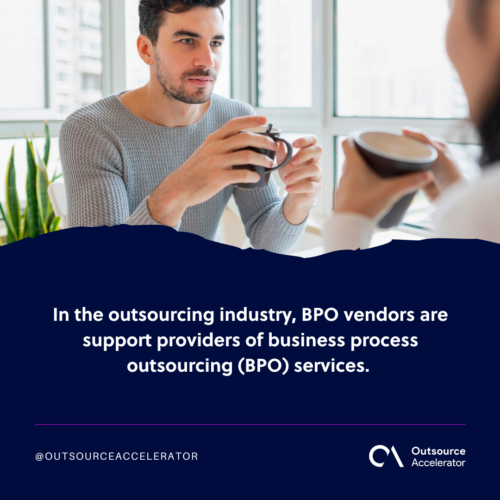Vendor
Definition
What is a vendor?
Otherwise known as a supplier, a vendor provides products or services to the rest of the supply chain. In most cases, a supply chain vendor makes inventory/stock items and then sells them onto the next link in the network.
What is a BPO vendor?
In the outsourcing industry, BPO vendors are support providers of business process outsourcing (BPO) services.
They offer a variety of services such as information technology (IT) and various forms of customer service. Other BPO providers may specialize in functions like HR or customer service.

What are outsourcing vendor services?
Payroll processing
Managing payroll in-house is not a problem if you have a small staff. However, if your firm grows to more than 15 employees, managing monthly payrolls can quickly consume a significant amount of your time.
This makes it difficult to keep track of workers’ applicable tax returns, bonuses, cash advances, employee join/exit formalities, and employee departures.
Payroll outsourcing, if done correctly, can save you money and make it easier to file your taxes and pay your employees.
Animation and creatives
There are times when you may need to outsource a portion of your animation production to a third-party company. Most of the work in the animation process can be done by third parties under the terms of a labor contract.
Animation outsourcing can lead to better results. Advertising banners, letterhead, business cards, and logos are also included in this service.
Human resources
When it comes to hiring, onboarding, and managing your employees, human resources comprise everything. To bring in qualified candidates for a new post, the most popular method of outsourcing in this field is to collaborate with a recruitment agency.
In addition to training, BPO vendors also offer benefits administration, payroll, and time and attendance management.
Social media marketing
In today’s world, many businesses are embracing social media sites like LinkedIn and Twitter to generate leads.
You might outsource this duty to a social media marketing agency as an entrepreneur. They’ll put together a team of experts who’ll be tasked with increasing and monitoring your fan base.
Bookkeeping
As a general definition, bookkeeping is the practice of keeping track of all financial transactions in an orderly way.
When you outsource your bookkeeping, you’ll have access to several advantages. This includes allowing your staff to devote more time to your company.
Additionally, you’ll be able to save money because outsourced accounting is less expensive than hiring a full-time accountant. You’ll also have access to specialists who can ensure accuracy and more.
Accounting
Accounting is one of the most frequently outsourced functions by small firms. If you’re not a financial specialist, you’ll need a lot of time and expertise to master all of the processes and compliance requirements that apply to your business. But a well-trained accountant may be able to handle this for a number of businesses at the same time. This boosts productivity and saves you money in the long run.
Marketing
The use of an outside marketing vendor can speed up the growth of your business. For example, they can handle ad design, content generation, and social media posting for you so you can focus on your company’s internal functions.
If you don’t have direct access to these professionals, you may be able to get unique ideas and useful solutions from outsourcing firms.
Administrative tasks
The use of virtual assistants is on the rise, particularly among entrepreneurs who operate from home offices. Everything from mailbox handling to social media posting can be handled by a virtual assistant.
Customer service
Customer service can be outsourced by organizations that interact primarily with clients online or over the phone. For this, you must first set up procedures and give specific instructions to the vendor that will be working with your clients on a daily basis.
Manufacturing
A small business may not be able to afford the high start-up costs of a manufacturing facility. On the other hand, a large number of companies outsource this stage.
About 18 percent of global manufacturing is still done in the United States. With this, you may be able to outsource some of your business functions to domestic vendors.
How do you choose an outsourcing vendor?
Once you’ve narrowed your list of potential vendors down to a manageable number, assign a numerical value to each of these and any other selection criteria you’ve made.
Take a look at the service quality and availability
To gauge the quality of the vendor’s service and availability, metrics are a smart place to start. For any service that you’re looking to outsource, there will be different KPIs to track.
Asking for metrics as part of the RFP process can help ensure that the vendor achieves your objectives.
Do research on safety and features
An unbiased assessment of the vendor’s security and services should be provided by a third party that is not affiliated with the company being reviewed. It’s also a good idea to double-check the scope of the review to make sure it includes the services you require.
Find out how they handle customer service
The RFP process is also a good time to inquire about their availability. How much time will they be available to you? Then, you’ll have to figure out which solution is best for you.
Choosing a provider who only provides customer service from 9 to 5 is a bad idea, especially if you need 24-hour assistance.







 Independent
Independent




